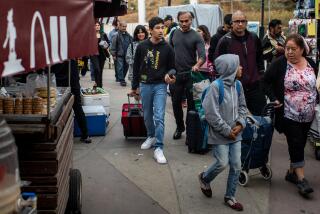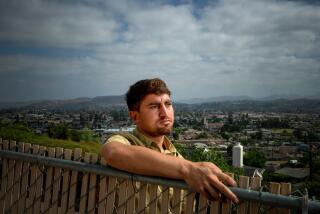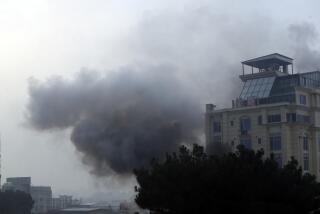Not a Terrorist, but Still Doing 9/11 Time
- Share via
BATAVIA, N.Y. — Nearly two years after the Sept. 11 attacks, a time when most foreign detainees have been sent home, Ansar Mahmood is desperate to remain in America.
A hard worker who delivered pizzas in upstate New York, he saved his money and supported his family in Pakistan. Like many immigrants, he found promise in the American dream.
But then he became one of countless Muslim immigrants picked up in a sweeping government dragnet. His life fell apart three weeks after the attacks, when he was suspected of being a terrorist because he had wanted his picture taken on a scenic Hudson Valley overlook that happened to be near a local water plant.
He was cleared of any terrorist intentions. But like most of the detainees, the government found other reasons to hold him -- he was convicted on a felony charge of helping friends who came here illegally from Pakistan. For that, he was sentenced to six days in jail. So far, he has served nearly 19 months while authorities seek to deport him.
Mahmood’s plight represents a post-Sept. 11 reality in America: Immigrants have always faced difficulties. But now it is all the harder to chase prosperity, even for people like Mahmood, who came here with his papers in order, worked 12- and 18-hour days to gain a foothold and still was able to send much of his money to his needy family back home.
“These days, all rules go out the window,” said Sareer Fazili, a fellow Muslim and Rochester, N.Y., attorney who heads a legal defense fund for immigrants. “It is zero tolerance toward any Muslims, male or female.”
Federal immigration officials, however, said they are merely following the law. “The fact is, he went to court and he has a conviction,” said Amy Otten, a spokeswoman for the federal Bureau of Immigration and Customs Enforcement. “He’s a felon.... We have to detain him.”
Mahmood’s continued incarceration is his own doing. He and his lawyers continue to file legal challenges to hold off his deportation and, they hope, win his release from the federal detention facility here so he can return to work. He is not eligible for bail.
But the government, noting that Mahmood is a convicted felon, argues that his deportation is automatic. In the aftermath of Sept. 11, with more stringent rules placed on immigrants, the government is not willing to bend in its resolve that this Pakistani must leave.
His offense is one that many legal observers say often was not prosecuted before terrorism became a concern.
Even Otten acknowledged that Mahmood’s crime might appear insignificant in the current atmosphere of terrorist alerts and sleeper cells. But, she said, the government takes immigration violations much more seriously now.
“The world has changed since Sept. 11,” she said. “It’s changed for everybody.”
According to government records, the average Sept. 11 detainee was held about 80 days before being released by federal law enforcement officials. Mahmood has served seven times as long; many believe he may be the nation’s longest-held Sept. 11 detainee.
Before his arrest, he said in a recent prison interview, he was sending about 40% of his income home to Punjab. His family purchased a refrigerator and a water heater for its two-room home; a color television too. His sisters wore new dresses.
But, Mahmood said, “I don’t have money now.... How can I send them anything? ... Their dream is finished.”
He turned 26 on Monday, his second birthday behind bars. He keeps a small package of family photos with him in prison.
While he was growing up, his family was very poor. His father had to retire as an army soldier because of failing health. The nine children slept on box springs. They shared a bicycle to get around.
In the late 1990s, like many poor Pakistanis, Mahmood began applying for entry into the United States. The State Department, besieged by requests worldwide, held lotteries granting certain numbers of diversity immigration visas.
After his second try, Mahmood’s name was chosen.
In April 2000, he flew to New York City, staying in Brooklyn for two weeks before moving to Salisbury, Md., and taking a job at a pizza restaurant. He worked in the kitchen and, after raising enough money to buy a 1992 Toyota, began delivering pizzas.
In early 2001, he moved to a Domino’s Pizza in Greenport, N.Y. “The best thing I liked was the Hudson Valley,” he said, “and seeing the river. And there were lots of deer. It’s the most beautiful place. But truly the most beautiful thing of all was that the Domino’s in the Hudson Valley paid more money than the Pizza City in Salisbury.”
He sometimes earned upward of $1,800 a month, he said, “not counting tips.”
Recalled his boss, Shahid Mahmood (no relation): “He just wanted to work all the hours he could. I said, ‘What do you want to do with all that money?’ And he said if he did not work 90 hours a week, he wouldn’t have enough to send home and to break even here.”
Ansar Mahmood’s family was delighted. But he said his sisters wanted him to send photographs too. So he bought a throw-away camera and, on Oct. 10, 2001, drove up near the Catskills. It was dusk, and he asked park rangers to snap his photo.
At the time, not only was law enforcement rounding up suspected foreign terrorists, but the country also was in the throes of an anthrax scare.
The guards noticed that Mahmood was posing not far from a city water plant. They called the police. The police called the FBI.
He was arrested, and he said he spent the night on a metal stool at police headquarters, his wrist chained to a rail, agents asking him over and over about the World Trade Center and the Pentagon and the anthrax-laden letters mailed to Florida, New York and Washington, D.C. They had photos too, and asked him about young men he assumed were the Sept. 11 hijackers.
Mahmood let them search his Toyota and his apartment, and agents said they found evidence that he had helped a man and woman from Pakistan. They said he had helped find them jobs at the Domino’s, registered a car for them in his name, put their apartment lease under his name and paid their first month’s rent.
Just a month earlier, he told the agents, he had discovered that the couple were in this country illegally.
He was charged with harboring illegals, a statute usually used against large immigrant smuggling operations in the Southwest. But the accusation against Mahmood was just one page long; the offense a single count. Nevertheless, it was a felony.
He served six days in the Albany County Jail. Like the vast majority of foreigners picked up in the aftermath of the attacks, he was never determined to have ties to terrorism. Neither court records nor his pre-sentencing report make any assertion that he was involved in the Sept. 11 attacks or any other terror plots.
On Oct. 16, 2001, he pleaded guilty in federal court -- advised by his public defender that a conviction likely would mean deportation. But Mahmood at the time was struggling with his English, and he had said he wanted out of the county jail and to return to work to make money for his family. A court transcript bears out his difficulties with the language.
“Sir,” he told the judge, “the girl’s brother is my friend, you know, in Pakistan we lived together.... When she came to here to take visa, I am working in the Hudson. Then the brother and the sister tell me just to help him to give him the job, to give him something like that, you know.
“I asked them, and I asked the manager, and he said yes. Then I arranged for something for him, and then he come to here for job.”
The judge asked, “Did you know that they were aliens?”
“Yes, I know,” Mahmood said.
Prosecutors did not recommend a punishment, although they noted that the maximum was five years in prison. The judge released him on bond, and Mahmood returned to Domino’s.
In the pre-sentencing report, examiners referred to Mahmood as a “quiet, shy and polite individual who avoided trouble.” They characterized him as one who “came from a less fortunate family background and worked hard to provide financial support for them.”
On Jan. 25, 2002, he was sentenced to the six days he had already served.
“I apologize, I do wrong thing, you know, just to help my family,” he told the judge. “I am sorry for this.”
Immigration agents picked him up at his lawyer’s office later that day, and he was ordered deported.
Fazili, the Rochester lawyer, tried unsuccessfully to get the conviction overturned, arguing that Mahmood really did not fully understand the implications of a felony conviction.
Rolando “Rex” Velasquez, a Buffalo lawyer and former attorney for the Immigration and Naturalization Service, tried to stop the deportation order. He failed. Velasquez took up the matter with the Board of Immigration Appeals, but again the appeal was denied. In February, he turned to the federal appellate court in New York; a decision is expected soon.
So, Mahmood remains in confinement. His old Toyota sits in front of his apartment, the car he bought to make his pizza delivers but also “because I wanted to see different places” in this country. “I think that’s the best thing in America,” he said, “not to be stuck in one place.”
More to Read
Sign up for Essential California
The most important California stories and recommendations in your inbox every morning.
You may occasionally receive promotional content from the Los Angeles Times.











